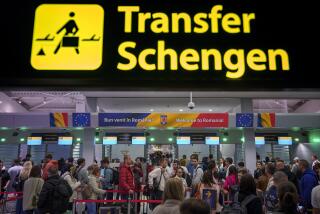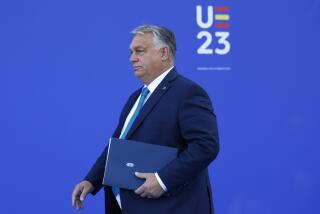The Curtain Parts
- Share via
“From Stettin in the Baltic to Trieste in the Adriatic,” said Winston Churchill in a famous speech 43 years ago, “an iron curtain has descended across the continent” of Europe. His metaphor quickly passed into the language of global politics, even as the somber reality it described continued to unfold. By 1948 Hungary and Czechoslovakia were forced to join Poland, eastern Germany, Romania and Bulgaria within the Soviet Union’s orbit of dominance, and the physical barriers that were erected to seal in the peoples of eastern Europe year by year deepened. As recently as 1961, with the Berlin Wall, harsh new steps were taken to intensify the forced separation of East and West. But now, in a significant gesture, at least one section of the iron curtain is starting to come down.
Hungary has begun to dismantle the 8-foot-high electrified barbed-wire fence that it built 40 years ago along 160 miles of its border with Austria. By the end of next year the fence and the grim watchtowers that guarded against frontier cross-ings by Hungarians are expected to be gone. The border with Austria won’t be completely open; Hungarian authorities have made clear that military patrols will go on. But major impediments to cross-border movement--and, symbolically, to political openness--will be removed.
It would be unrealistic to expect that the other Communist states abutting western Europe will take similar action soon. The governments of Czechoslovakia and East Germany remain implacably opposed to the kind of political reforms taking place in Hungary, Poland and, to a lesser extent, the Soviet Union. Later this year, Hungary says it intends to hold multiparty elections; it is even conceivable, if not likely, that the ruling Communist Party could find itself on the short end of the vote count.
Hungary says it didn’t consult with its Warsaw Pact allies, including the Soviet Union, before beginning to turn its part of the iron curtain into scrap metal. That is yet another sign of increasing independence in a time of revolutionary change.
More to Read
Sign up for Essential California
The most important California stories and recommendations in your inbox every morning.
You may occasionally receive promotional content from the Los Angeles Times.













